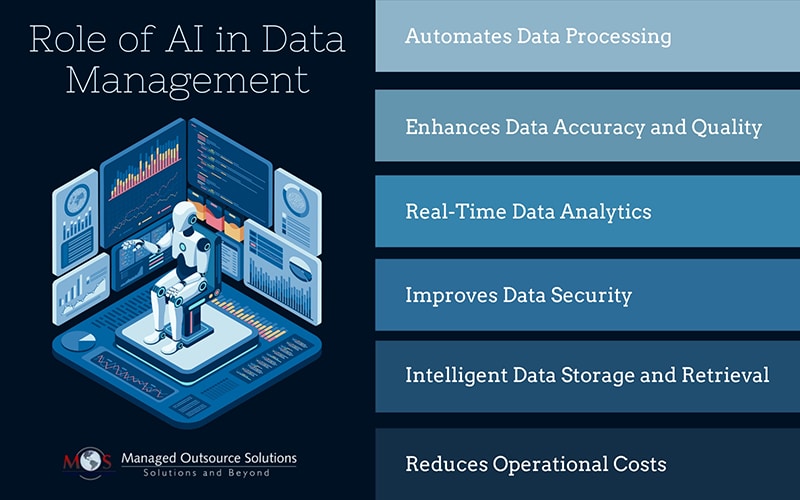As companies accumulate more and more data, analyzing, managing, and leveraging this information for decision making becomes critical. Efficient data management reduces issues caused by poor-quality data—like increased friction, inaccurate predictions, and basic inaccessibility—ideally preventing them before they occur Managing large volumes of data manually can be a daunting task. Artificial Intelligence (AI) is transforming this landscape. AI-driven data management incorporates AI, machine learning (ML), and frequently robotic process automation (RPA) into different phases of the data management lifecycle. The common areas where AI is playing a key role in 2025 are data extraction, accessibility, cleansing, discovery, processing, security, and analytics.
Role of AI in Data Management
Today’s organizations collect massive datasets—from financial transactions and product inventories to employee records and information on customer preferences. However, the challenge is making these large datasets accurate, reliable and accessible enough for business analytics and decision making. According to the IBM® Data Differentiator, 82% of enterprises struggle with data silos that hinder critical workflows. Additionally, up to 68% of organizational data remains unanalyzed, preventing businesses from fully utilizing its potential.
- Enhances Data Accuracy and Quality: AI-driven data validation ensures accurate, consistent, and up-to-date records, reducing errors that could compromise decision-making and patient safety.
- Real-Time Data Analytics: AI analyzes vast datasets instantly, enabling businesses to make informed decisions, predict trends, optimize operations, and enhance customer experiences.
- Intelligent Data Storage and Retrieval: AI optimizes data organization and retrieval by learning usage patterns, improving access speed, minimizing delays, and boosting workflow efficiency.
- Reduces Operational Costs: AI automates repetitive data management tasks, cutting labor costs, improving productivity, and enabling better resource allocation.
- Safeguards Data: AI and ML strengthen data security by detecting anomalies, identifying potential threats, and preventing unauthorized access.
While everyone in the organization needs to understand their role in addressing data quality proactively, AI is a powerful tool that can significantly boost productivity and enhance the value companies derive from their data. AI’s ability to process, analyze, and extract insights from data is indeed a game-changer for businesses.
Below, we explore some real-world examples of AI applications in data management.
Applications of AI in Data Management
Data Entry
AI automates data entry by extracting, validating, and organizing information from various sources like forms, invoices, and emails. It reduces manual errors, speeds up processing, and improves accuracy.
Example: AI-powered data entry solutions can automatically enter patient details from intake forms into electronic health records (EHRs). AI can scan handwritten notes and convert them into structured digital records, ensuring accurate and efficient documentation. By eliminating manual data entry, AI reduces errors and frees up more time for patient care.
Data Extraction
AI simplifies data extraction by automatically gathering information from multiple sources, such as documents, databases, and websites. It eliminates manual work by identifying key data points, removing duplicates, and organizing information efficiently. This improves accuracy and saves time.
Example: Banks use AI to extract data from loan applications, verifying customer details and financial records instantly. This speeds up approvals and reduces errors compared to manual processing. For example, AI-powered tools can scan and validate income statements, credit scores, and identification documents, ensuring faster and more reliable loan decisions.
Data Discovery
Automation helps in tracking and managing scattered data from multiple sources in a centralized manner. AI and ML automate key aspects of data discovery, giving organizations a clear view of where their data assets reside. This visibility is essential for effectively utilizing data and safeguarding it from security breaches. Here are some examples of AI in data discovery:
- Customer behavior analysis: Retailers can leverage AI-powered data discovery tools to consolidate data from online purchases, in-store transactions, and social media interactions. These tools uncover patterns in customer behavior, helping businesses tailor marketing strategies and optimize inventory management.
- Analyzing complex financial data sets: Financial institutions rely on vast amounts of data from transactions, market trends, customer records, and regulatory reports. AI, ML, and RPA help identify patterns, extract valuable insights from complex datasets, and detect fraudulent activities. This supports better risk management and enhances operational efficiency.
Data Processing
AI-powered tools automate data extraction, deduplication, error detection, and classification, streamlining unstructured data management and boosting efficiency. This can have a significant impact for retail businesses which collect data from online sales, in-store transactions, customer feedback, and inventory records.
AI-powered tools automate data extraction from diverse sources, eliminating duplicates and inconsistencies while classifying information based on predefined categories such as product type, pricing, and customer preferences. Large retailers like Walmart and Amazon use AI-driven data management systems to streamline inventory tracking, improve demand forecasting, and enhance personalized marketing.
Data Cleansing
AI improves cleansing of datasets by automating anomaly detection, duplicate detection and removal, missing value imputation, data standardization, and pattern recognition. Here are some examples of AI in data cleaning:
- In finance, AI-driven anomaly detection can identify fraudulent transactions and unusual trading patterns in real-time. AI also automates data standardization to ensure consistency across financial reports, transactions, and compliance records. AI converts dates into a uniform format (e.g., MM/DD/YYYY to YYYY-MM-DD) for consistency in reporting.
- Certain master data management (MDM) tools leverage AI and ML to identify and correct errors and duplicate records. For instance, they can automatically merge duplicate customer profiles that share the same name, address, and contact details.
- AI-driven data validation techniques ensure that information is accurate, consistent, and up-to-date.
- Some AI tools can convert data into the required format, such as transforming unstructured meeting notes into structured tables.
AI algorithms can identify subtle errors that might be missed by manual review.
Data Accessibility
AI enhances data accessibility by automatically organizing, indexing, and retrieving information from vast datasets, making it easier for users to find relevant data quickly. It also enables real-time access to structured and unstructured data across multiple platforms, improving efficiency and decision-making.
- Large organizations use AI-driven search engines to retrieve relevant documents, emails, and records quickly. AI-powered search works by analyzing keywords, context, and user behavior.
- AI-powered virtual assistants, like Amazon Alexa for Business or Google’s AI-driven analytics tools, allow users to access reports and dashboards through voice commands.
- LLM-powered databases and data catalogs allow users search for data using natural language instead of writing code or SQL queries. These systems can also refine searches, enhance datasets, and suggest related data points for better insights.
Data Security
AI-powered systems can analyze large amounts of data, detect potential breaches, identify patterns, and respond to threats in real time. For example, a financial institution can use AI-driven fraud detection to monitor transactions in real time. If an unusual transaction pattern—such as a sudden large withdrawal from an unfamiliar location—is detected, the AI system immediately flags it and alerts the bank. This proactive approach prevents potential fraud and unauthorized access, ensuring data security.
Leverage AI-driven Outsourcing Solutions
In today’s digital era, data is the mainstay of decision-making for businesses. AI is transforming data management by automating processes, improving data accuracy, and enabling real-time insights. Business process outsourcing companies are incorporating RPA and AI to automate repetitive tasks, analyze data, improve security, and deliver personalized solutions.
Schedule a free consultation with our experts and explore how our BPO services can transform your business processes.
RPA services and AI-driven solutions allow BPO companies to deliver services with remarkable speed and efficiency. By leveraging these advanced solutions, organizations can boost data management, ensure faster and smarter decision-making, and gain a competitive edge.





